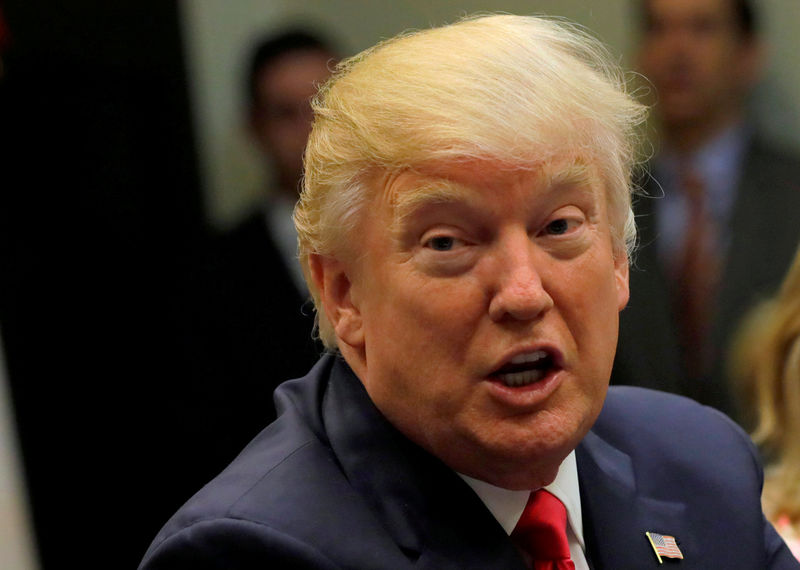By David Lawder, Steve Holland and David Morgan
WASHINGTON (Reuters) - President Donald Trump has neither a clear White House tax plan nor adequate staff yet to see through a planned tax reform, according to interviews with people in the administration, in Congress and among U.S. tax experts.
In an echo of its attempt to roll back Obamacare that ended in an embarrassing collapse in Congress, the Trump administration has vowed quick action on taxes. But it has yet to appoint people with the skills to evaluate complex tax laws, draft legislation and sell it to deeply divided lawmakers.
Burned by last week's failed healthcare measure largely authored by House of Representatives Republicans, Trump is determined not to count on Congress so much this time for handling the details on taxes, his second major legislative initiative.
But that only underscores his need for a strong White House tax team, which the administration still lacks. Many policy options are still being studied, from deficit-funded tax cuts to a European-style value-added tax.
"They're still sorting out who's in charge, who's going to take the lead," said William Hoagland, a longtime Senate Republican aide who worked on the last successful comprehensive tax reform effort in 1986.
"You need someone who has the ear and support of the president who can sell a tax plan, and you need the technical support for that person,” said Hoagland, now senior vice president at the Bipartisan Policy Center, a think tank.
Financial markets have been reassessing expectations of fast action on taxes that have helped fuel a Trump stocks rally.
Members of Trump's tax team are known, but not their exact duties. Treasury Secretary Steven Mnuchin and National Economic Council Director Gary Cohn are senior team leaders. Others include White House advisers Steve Bannon, Jared Kushner, Chief of Staff Reince Priebus and Commerce Secretary Wilbur Ross.
Trump huddled with Mnuchin on Thursday to discuss taxes.
“We are at the first stages of this process, beginning to engage with members of Congress, policy groups, business leaders, industry, constituents from around the country, and other stakeholders,” White House spokesman Sean Spicer told reporters on Thursday, Trump's 69th day in office.
When Trump was elected in November, Republican lawmakers enthusiastically joined his call to rewrite the tax code and dismantle Obamacare in the first 100 days of his presidency.
In early February, Trump promised a "phenomenal" tax plan by early March that never appeared. Mnuchin spoke on Feb. 23 of enacting tax reform by August. Spicer acknowledged this week that the timetable could be slipping.
Another senior White House official said the administration had assumed it would still be working on healthcare at this point, not tax reform yet. The official, not authorized to speak publicly, spoke to Reuters on condition of anonymity.
So far, Trump's tax campaign is a far cry from President Ronald Reagan's 1986 effort, in which Don Regan, as Treasury secretary and then White House chief of staff, spent many months developing legislation that won bipartisan support in Congress.
"The process under Reagan was much more developed, elaborate and long, and there was a strong bench of top-rate technicians putting things together," said Steven Rosenthal, senior fellow at the nonpartisan Tax Policy Center, a think tank.
Under Trump, he said, "None of that is happening."
'A LOT SIMPLER'
During the 2016 election campaign, Trump issued a tax plan that partly resembled one developed by House Speaker Paul Ryan, but Trump does not now appear wedded to either. It is a safe bet he will not lean heavily on the plan from Ryan, who drafted and championed the ill-fated plan to gut Obamacare.
"Trump now desperately needs a policy victory ... I would expect the president to play a much more activist role,” said Stephen Moore, a fellow at the Heritage Foundation, a think tank. Moore helped write the Trump campaign tax plan.
Mnuchin last week talked about a middle-class tax cut. He also said tax reform in many ways would be "a lot simpler" than healthcare, dismaying tax experts who said that is not so.
Comprehensive tax reform is so complex that it has defied Congresses and presidents since Reagan. Tax law is riddled with loopholes embedded in the economy and defended by beneficiaries.
Some fundamental questions remain unanswered within the Trump team. For instance, it is unclear if Trump would support a plan that adds to the budget deficit. Past tax reform efforts have tried to be "revenue neutral."
Trump also has sent mixed messages on Ryan's proposed "border adjustment tax" that would end the corporate deduction for import costs and make export income tax-free, aiming to boost exports and raise new tax revenues.
The Trump team is heavy on Wall Street experience, but short on tax expertise. At Treasury, Mnuchin is the only Senate-confirmed political appointee in place. The job of Treasury assistant secretary for tax policy is unfilled.
A person familiar with the hiring process for the job said: "Treasury needs more capable tax expertise ASAP, or the White House will yank total control for tax reform from the department for the rest of the year, maybe beyond."
Mark Mazur, who held the Treasury tax job under former Democratic President Barack Obama, said Mnuchin has too much on his plate to concentrate fully on taxes.
Mnuchin has praised Treasury's 100 tax policy career staff, but they can only offer options to Trump appointees, said Mazur, now director of the nonpartisan Tax Policy Center.

"The political appointees are the ones who need to turn the crank on the sausage-making machine," Mazur said.